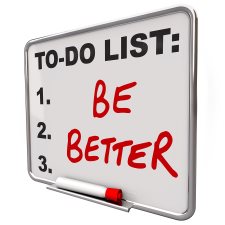Self-Improvement Tips to Avoid an Impending Career Derailment

One of the most important means of attaining immediate performance improvement is to seek instant feedback. Receiving constructive criticism is more than about simply accepting your faults but about taking incremental steps over the long-term to identify problem areas and consciously work to improve your performance. But useful feedback doesn’t always come from outside observers. Becoming an internal observer of your own behavior can help you take stock of your reactions to your work and understand what matters most to you. The higher your level of self-awareness, the more you know about yourself and what you can offer your company at a given juncture.
To stay relevant to your company, you have to remain aligned with it as its culture changes over time. To that end, you must first understand the organizational culture by analyzing the decision-making processes and axioms on which the organization relies when addressing challenges and capitalizing on opportunities. To do this you must learn to be an active listener, meaning always asking questions to make sure you understand what is happening around you and concentrating on single conversations and moments so that you can remember the key information being shared.
Part of being a vital component of your organization is participating in the regular goings-on of the workplace. That means you can’t allow yourself to become too much of a loner and need to remain open with your thoughts and contributions to the decision-making process. The more influential and effective you become, the more facts and feelings you regularly share, the more vital you become to maintaining a successful status quo.
Keeping an eye on your organizations future needs and working to align your own development to meet those needs is great, but you can’t sacrifice your current work for what may be expected of you in the future. Employees are valued for the work they get done now, so stay focused on what needs to get done each day and close out tasks as they arise. Having a main job that is always current lets you better assess the shape of things to come.
Finally, stay out of a mental rut by learning from your mistakes and refusing to dwell on the past. If the environment has changed, it needs to be addressed on a new footing and with new ideas and solutions, provide them. Expose yourself to new routines so that you become more adaptable to a changing environment. Not only will you create opportunities to develop new relationships, your flexibility and adaptability will be appreciated by your co-workers and, in turn, create a more effective team.

